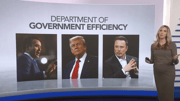Could your phone and internet bills drop? Supreme Court weighs $8 billion program
By
Veronica E.
- Replies 0
In the ever-changing world of phone and internet services, one Supreme Court decision could make a big difference in your monthly bills.
The justices are reviewing an $8 billion program designed to help millions of Americans—especially those in rural areas, low-income households, and schools—stay connected.
But the way this program is funded is now under legal scrutiny, and the outcome could have a lasting impact on how much you pay for these essential services.
At the center of this case is the Universal Service Fund (USF)—a program created in 1996 to make communication services more accessible nationwide.
The USF is funded by fees charged to telecommunications companies, which are usually passed down to consumers.
However, opponents argue that this system acts as an unconstitutional tax, since Congress never directly approved it.

The heart of the legal battle lies in a key question: How much authority can Congress delegate to a federal agency?
In this case, the Federal Communications Commission (FCC) oversees the USF, but an outside administrator determines how much money is needed each quarter.
A group of challengers, led by Consumers’ Research, argues that only Congress should have the power to set fees, calling the current system "taxation without representation."
R. Trent McCotter, the attorney representing those challenging the case, stated: “The amount of public revenue to raise is a quintessential legislative determination, not some minor detail to be filled in later.”
Justices from both liberal and conservative sides challenged McCotter’s claim that the program would be constitutional if Congress simply imposed an upper limit, even as high as $1 trillion. They questioned whether such a limit would hold any real significance.
“That seems pretty empty,” Justice Amy Coney Barrett remarked. “It’s just kind of throwing a number out there for the sake of throwing a number. Why have they really set the policy in a way that's meaningfully different than they did in the statute?”
McCotter argued that setting a clear limit would satisfy Congress’s taxing authority.
However, Justice Brett Kavanaugh questioned the logic of treating a $1 trillion cap as a real constraint while overlooking the FCC’s mandate to collect only “sufficient” funds for universal service.
Meanwhile, Justice Elena Kagan pointed out that the USF already has clear guidelines, restricting its funding to services that support education, public health, and public safety.
This case is about more than just one program—it’s part of a broader movement to limit the power of federal agencies.
However, Paul Clement, former solicitor general under President George W. Bush and representative for program users, argued that this case is not the right one to challenge past Supreme Court rulings on the non-delegation rule.
“We all benefit from having a communications system that is truly universal,” he said. “I may not live in rural Alaska, but it’s nice to be able to place a call there.”

The Justice Department has warned that if the Supreme Court rules against the USF, it could affect not just phone and internet services, but other federal programs as well.
“The consequences of (the challenger’s) position are really troubling,” said Acting Solicitor General Sarah Harris, warning it would create a “minefield for the US code.”
She noted that Congress has long used this delegation framework in areas like securities regulation, labor relations, and air quality. Several justices shared her concern.
Justices Samuel Alito and Amy Coney Barrett raised concerns about how this could disrupt funding for rural areas and communities that rely on government-supported services.
A decision is expected by the end of June, and depending on the ruling, it could lead to major changes in how phone and internet services are funded—and possibly how much you pay for them.
For older Americans, affordable phone and internet access is more than just a convenience—it’s a necessity.
Whether it’s for staying in touch with family, managing healthcare needs, or simply staying informed, these services play a critical role in everyday life.
If the Supreme Court limits the USF, it could make these services harder to afford for many seniors, especially in rural or underserved areas.
As we wait for the Court’s decision, one thing is clear: Staying informed about policies that affect our daily lives is more important than ever.
Here at The GrayVine, we’ll continue to follow this case closely, keeping you updated on what it means for your connectivity, your budget, and your community.
Read next: WARNING: Delete this text NOW–police urge immediate action!

What do you think? Do you believe phone and internet fees should be handled by Congress? How important is affordable access to you? Join the discussion in the comments below!
The justices are reviewing an $8 billion program designed to help millions of Americans—especially those in rural areas, low-income households, and schools—stay connected.
But the way this program is funded is now under legal scrutiny, and the outcome could have a lasting impact on how much you pay for these essential services.
At the center of this case is the Universal Service Fund (USF)—a program created in 1996 to make communication services more accessible nationwide.
The USF is funded by fees charged to telecommunications companies, which are usually passed down to consumers.
However, opponents argue that this system acts as an unconstitutional tax, since Congress never directly approved it.

Reliable phone service is essential for staying connected, especially in rural areas where access can be limited. Image Source: YouTube / Anna Shvets.
The crux of the controversy
The heart of the legal battle lies in a key question: How much authority can Congress delegate to a federal agency?
In this case, the Federal Communications Commission (FCC) oversees the USF, but an outside administrator determines how much money is needed each quarter.
A group of challengers, led by Consumers’ Research, argues that only Congress should have the power to set fees, calling the current system "taxation without representation."
R. Trent McCotter, the attorney representing those challenging the case, stated: “The amount of public revenue to raise is a quintessential legislative determination, not some minor detail to be filled in later.”
Justices from both liberal and conservative sides challenged McCotter’s claim that the program would be constitutional if Congress simply imposed an upper limit, even as high as $1 trillion. They questioned whether such a limit would hold any real significance.
“That seems pretty empty,” Justice Amy Coney Barrett remarked. “It’s just kind of throwing a number out there for the sake of throwing a number. Why have they really set the policy in a way that's meaningfully different than they did in the statute?”
McCotter argued that setting a clear limit would satisfy Congress’s taxing authority.
However, Justice Brett Kavanaugh questioned the logic of treating a $1 trillion cap as a real constraint while overlooking the FCC’s mandate to collect only “sufficient” funds for universal service.
Meanwhile, Justice Elena Kagan pointed out that the USF already has clear guidelines, restricting its funding to services that support education, public health, and public safety.
Also read: Warning: Your cable bill could skyrocket soon—see which major TV operator is bumping up prices!
The bigger picture
This case is about more than just one program—it’s part of a broader movement to limit the power of federal agencies.
However, Paul Clement, former solicitor general under President George W. Bush and representative for program users, argued that this case is not the right one to challenge past Supreme Court rulings on the non-delegation rule.
“We all benefit from having a communications system that is truly universal,” he said. “I may not live in rural Alaska, but it’s nice to be able to place a call there.”

Reliable phone service is a lifeline for rural communities, keeping residents connected to family, healthcare, and emergency services. Image Source: Pexels / Andrea Piacquadio.
Also read: Find out how T-Mobile may have tricked you with hidden fees for 20 years!
The implications for you and the nation
The Justice Department has warned that if the Supreme Court rules against the USF, it could affect not just phone and internet services, but other federal programs as well.
“The consequences of (the challenger’s) position are really troubling,” said Acting Solicitor General Sarah Harris, warning it would create a “minefield for the US code.”
She noted that Congress has long used this delegation framework in areas like securities regulation, labor relations, and air quality. Several justices shared her concern.
Justices Samuel Alito and Amy Coney Barrett raised concerns about how this could disrupt funding for rural areas and communities that rely on government-supported services.
A decision is expected by the end of June, and depending on the ruling, it could lead to major changes in how phone and internet services are funded—and possibly how much you pay for them.
Also read: Not everyone gets this number—The quiet favor raising eyebrows
What this means for the over-60s community
For older Americans, affordable phone and internet access is more than just a convenience—it’s a necessity.
Whether it’s for staying in touch with family, managing healthcare needs, or simply staying informed, these services play a critical role in everyday life.
If the Supreme Court limits the USF, it could make these services harder to afford for many seniors, especially in rural or underserved areas.
As we wait for the Court’s decision, one thing is clear: Staying informed about policies that affect our daily lives is more important than ever.
Here at The GrayVine, we’ll continue to follow this case closely, keeping you updated on what it means for your connectivity, your budget, and your community.
Read next: WARNING: Delete this text NOW–police urge immediate action!
Key Takeaways
- The Supreme Court appears likely to uphold an $8 billion subsidy program that provides high-speed internet and phone service to millions of Americans following a
legal challenge. - The challenge raises questions about the extent of Congress’s authority to delegate legislative power to federal agencies and whether the Supreme Court should impose stricter limits.
- Both conservative and liberal justices expressed skepticism toward the challengers’ argument that the funding setup amounts to "taxation without representation."
- If the program’s funding structure is ruled unconstitutional, it could have far-reaching consequences for numerous other federal programs—a concern highlighted by both the
justices and the Department of Justice.
What do you think? Do you believe phone and internet fees should be handled by Congress? How important is affordable access to you? Join the discussion in the comments below!






